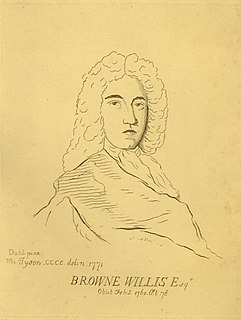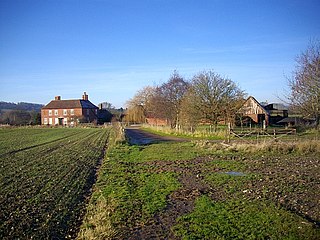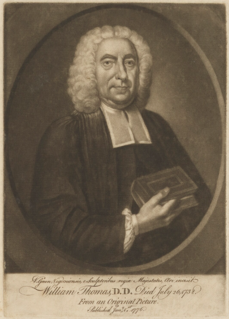John Dart (died 1730) was an English lawyer and cleric, known as an antiquary and man of letters.
Contents

John Dart (died 1730) was an English lawyer and cleric, known as an antiquary and man of letters.

Initially an attorney, but not successful in the profession, Dart obtained a title for holy orders. In 1728, he was presented by the master of St. Cross Hospital, Winchester, to the perpetual curacy of Yateley, Hampshire. He served the church from the neighbouring village of Sandhurst, Berkshire, where he died in December 1730, and was buried on the 20th at Yateley. [1]
Dart wrote: [1]
Attribution
![]() This article incorporates text from a publication now in the public domain : Stephen, Leslie, ed. (1888). "Dart, John". Dictionary of National Biography . Vol. 14. London: Smith, Elder & Co.
This article incorporates text from a publication now in the public domain : Stephen, Leslie, ed. (1888). "Dart, John". Dictionary of National Biography . Vol. 14. London: Smith, Elder & Co.
Nathan Bailey, was an English philologist and lexicographer. He was the author of several dictionaries, including his Universal Etymological Dictionary, which appeared in some 30 editions between 1721 and 1802. Bailey's Dictionarium Britannicum was the primary resource mined by Samuel Johnson for his Dictionary of the English Language (1755).

Browne Willis was an antiquary, author, numismatist and politician who sat in the House of Commons from 1705 to 1708.

Francis Cottington, 1st Baron Cottington was the English lord treasurer and ambassador and leader of the pro-Spanish, pro–Roman Catholic faction in the court of Charles I.
Robert William Eyton was an English Church of England clergyman who was author of The Antiquities of Shropshire.
William Barnard was an Anglican bishop, Bishop of Derry from 1747 until his death.
Richard Alvey was an English clergyman, known as the master of the Temple Church.

Henry Bright was a clergyman and schoolmaster in Worcester. He served for 38 years Headmaster at The King's School, Worcester, and is mentioned by Thomas Fuller and Anthony Wood as an exceptional teacher, particularly of Latin, Greek and Hebrew. Many of his pupils are notable for their faculty in Latin and Greek and their impact on theological matters.
Edward Gee (1657–1730) was an English churchman, known as a controversialist, and later successively Dean of Peterborough and Dean of Lincoln.

John Davies (1679–1732) was an English cleric and academic, known as a classical scholar, and President of Queens' College, Cambridge from 1717.
Frederick Mackenzie (1788?–1854) was a British watercolourist and architectural draughtsman.
John de Derlington was an English Dominican, Archbishop of Dublin and theologian.
John Dryden (1667/8–1701) was a writer. He was the second son of the poet John Dryden (1631–1700) and was educated at Westminster and University College, Oxford. He translated Juvenal's fourteenth satire, and wrote one comedy.
William Dade (c.1740–1790) was an English cleric and antiquary.
Samuel Denne (1730–1799) was an English cleric and antiquarian.
John Denne D.D. (1693–1767) was an English churchman and antiquarian, Archdeacon of Rochester from 1728.
James Davidson (1793–1864) was an English antiquary and bibliographer.
Rowland Davies (1649–1721) was Church of Ireland dean of Cork.
John Sidney Hawkins was an English antiquarian. Considered reclusive, he is known largely for his publications.

William Thomas (1670–1738) was an English clergyman and antiquary. He was educated at Westminster School and Trinity College, Cambridge, from which he received two degrees. Through the influence of distant relation John Somers, 1st Baron Somers, he was granted the living of Exhall in Warwickshire and later became rector of St Nicholas in Worcester. Thomas received two further degrees in divinity in the 1720s, including a doctorate. As part of his work as an antiquary Thomas visited every church in Worcestershire and transcribed many documents, including the now lost Red Book of Worcester.